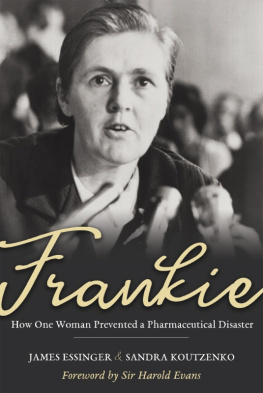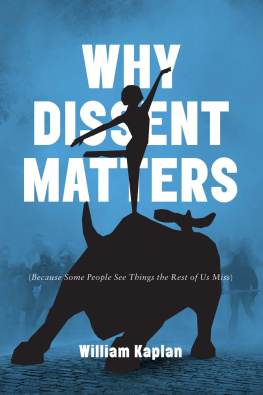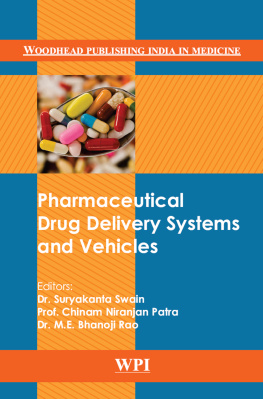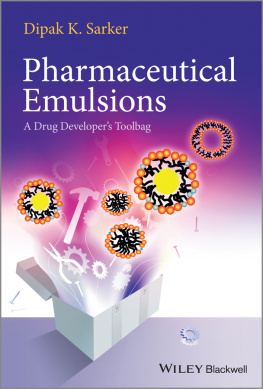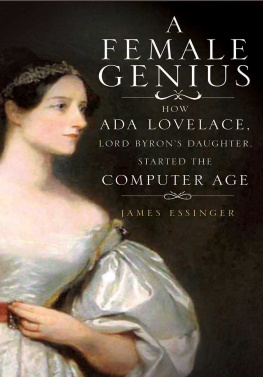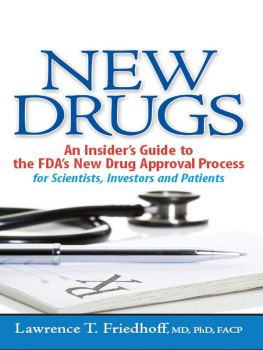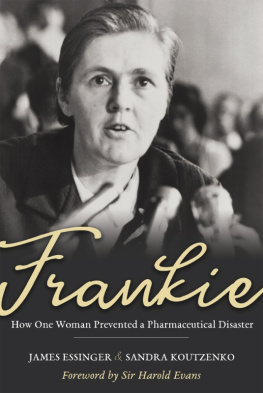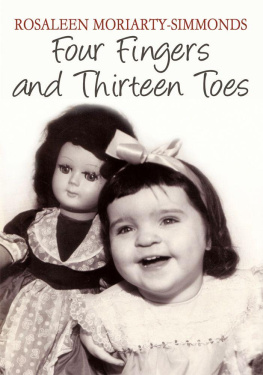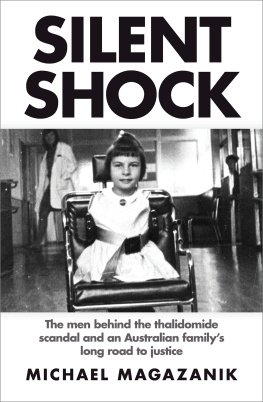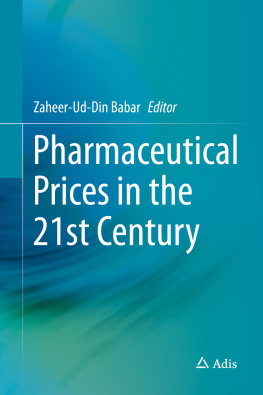Copyright 2018 James Essinger
Published by Wellspring
All rights reserved.
No part of this book may be used or reproduced in any manner whatsoever without permission except in the case of brief quotations in critical articles or reviews.
Design by Ashley Wirfel
ISBN 978-1-63582-046-1 (hardcover)
ISBN 978-1-63582-110-9 (ebook)
Library of Congress Control Number: 2018951837
10 9 8 7 6 5 4 3 2 1
Printed in the United States of America
FIRST EDITION
To Briony Kapoor, in admiration. (JE)
To my grandmother Marie-Madeleine Sablery, whose own quiet heroism taught me the true meaning of strength. (SK)
If thalidomide had been developed in this country, I am convinced that it would easily have found wide distribution before the terrible power to cause deformity had been apparent.
Dr. Helen Taussig in Scientific American, August 1962
I was just absolutely shocked to hear that this drug company had applied pressure on her [Frances Kelsey]. I mean it was outrageous, pressurizing a medical officer of the FDA.It was the first personal awakening that really mattered as to what corporate conduct could be. How bad it can be. How criminal it can be in some cases.
Morton Mintz, interviewed on April 27, 2007, by Professor Charles Lewis of The Investigative Reporting Workshop
thalidomide, the greatest drug tragedy ever known
Sir Harold Evans in a letter to Dr. Frances Kelsey (2015)
Please note:
We mostly refer in this book to our heroine as Frankie. We never had the pleasure and privilege of meeting her, which would in fact have been feasible, as she passed away comparatively recently, on August 7, 2015, aged 101. But we have had the privilege of being assisted in our research by people who knew Frances, in particular Dr. John Swann, her former colleague at the United States Food and Drug Administration (FDA).
Even though we never met her, it seems excessively formal for us to refer to Frances here, in what is essentially an affectionate and admiring biography, as Frances, still less as Dr. Kelsey, though we do use that name sometimes.
During her lifetime, she was known as Frankie by her parents, many of her schoolteachers, her husband, and many colleagues and friends. We hope that this book will give many more the opportunity to know this remarkable and brilliant woman, and so weve decided to refer to her informally as Frankie.
Please also note that all material contained in brackets is interpolations by the authors for clarity.
JE & SK
This biography has the excitement of mythical narrative and the relevance of the days news feed. A young mother stands alone against Dark Forces ready to release disabling neurotoxins on our planet. She prevails by summoning the magical power of Truththe eternal verity itself now under assault in post-truth societies that discount evidence in favor of fable and alternate realities.
The heroine is Dr. Frances Oldham Kelsey, the centenarian Frankie (19142015) of the authors engaging title. She was in her forties working out of a bleak bare-floor office as a new medical officer at the Food and Drug Administration. Her first random assignment in 1960 was to agree to the distribution in America of a new wonder drug, now notorious as thalidomide. She found herself confronted by the imperial power of American business in the form of the pharmaceutical company, Richardson-Merrell. They expected her to rubber-stamp approval of their submission. After all, thalidomide had already been patented in Germany and was being promoted by its makers as nontoxic, no side effects, completely nonpoisonous, and safer than all other tranquilizers for relief in pregnancy from sleeplessness and morning sickness.
The Richardson-Merrell executives (all male) had ten million pills ready for market. They represented a lottery of lies. Dependent on the day it was ingested, a single dose of thalidomide could kill babies in the womb, degrade their organs, or lop off limbs. The German inventors, Chemie Grnenthal, didnt know this, but they did ignore plenty of warning signs. They were new to pharmaceuticals, but other companies, including the liquor makers Distillers in the UK, more or less took them on trust. Globally, thalidomide had eighty-nine different brand namesContergan in Germany, Distaval in Britain, Kevadon in the US. Every one of them was poison.
The valiant thalidomiders of today with no arms, no legs, have made the best of lives devastated by the dangerous pill. They had faith in their doctors. Their doctors were betrayed by the incompetence and greed of the drugmakers. And then pretty well everywhere the devastated families were betrayed by the callous disregard of their governments.
This is the fate that would have been ordained for millions of Americans had Frankie not persisted. How did she prevail? She asked questions of Richardson-Merrell, good questions that got nowhere, as the authors track in exchanges from September 1960 to February 1961. For Frankie, a scientific truth must emerge from the most convincing evidence, and is always open to correction.
Frankie did not know what the precise catastrophic effects of thalidomide would be, but her scientific training was enough to alert her to the evidence that neurotoxins were likely to harm the fetus. Richardson-Merrell attacked her and the FDA for interfering with business. The questions infuriated Richardson-Merrell for a simple reason. They couldnt answer them. Nobody could because none of the parties had done proper testing. One Kelsey memorandum is tellingly highlighted by the authors: We feel that we do not know enough about the metabolism and pharmacological effects of Contergan.
Her vigilance delayed the approval of the drug through November 1961, by which time hundreds of abnormal births had raised enough alarm for thalidomide to be withdrawn in Germany and Britain, though it was withdrawn more slowly in Canada and Spain.
At The Sunday Times in London, when we undertook an investigation of the deformed births, we were appalled that the drug, already approved by the National Health Service, was not even then subjected to a searching public inquiry of the kind that routinely attends disasters. The thenUK health minister, Enoch Powell, sided with the delinquent drug company. So did his officials, Parliament and Press. The chant they all took up was that thalidomide had been tested according to the standards of the time. Nobody bothered to determine the reproductive standards of the worlds best companies. The families were left to feel they had been punished by an unforeseeable act of God. Of course, it was said, they were free to seek compensation from the drug company. Good luck with that. When

